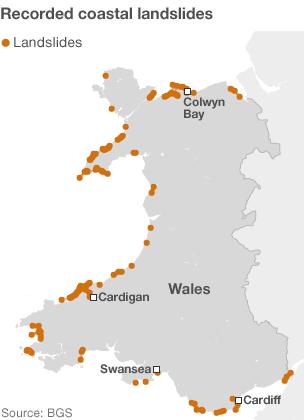Welsh strategy to reduce risks from floods and erosion
- Published
Wales must prepare for coastal erosion such as the landslip that left 15 caravans teetering on the edge of cliff near Barry, a minister says.
Environment Minister John Griffiths is launching a new strategy aimed at managing and reducing the risks and fall out of flooding and erosion.
It aims to raise awareness, improve responses and prioritise investment in the areas most at risk.
One expert says people must accept saving all the coastline is too costly.
The Welsh government estimates one in six properties in Wales is at risk of flooding from rivers, the sea or surface water.
Mr Griffiths is launching a new national strategy at Borth in Ceredigion where £12m is being spent on a coastal flood defence scheme to protect 422 homes and businesses.
He referred to the "significant flooding" in 1990, which saw around 2,800 properties flooded and thousands evacuated when defences were breached in Towyn and Kinmel Bay areas in north Wales.
Mr Griffiths said this month's rock fall at the Porthkerry, near Barry, which left 15 caravans teetering on a cliff edge had been a stark reminder of the dangers faced.
Loss of land
"The evidence suggests that in future we may see more events like these, with higher sea levels, increases in the intensity of rainfall and more frequent flooding," he said.
"The consequence of that flooding will include greater risks to life, the economy and the environment.
"Coastal erosion will increase, with more coastal communities facing the loss of land, properties and resources."
But he said with proper planning the risks could be managed and the consequences reduced.
He said the Welsh government would continue to invest in flood and coast protection and a successful bid for £50m of European money had offset any reduction in the government's budget.
Prof Mike Phillips, head of the school of built and natural environment at Swansea Metropolitan University, said there were already a lot of good partnerships in Wales but the work needed to be built on.
Better predictions
"What is changing now and where I think we are starting to make great advances is in realising some times it's too expensive to defend the coastline," he explained.

He said areas of high economic importance would continue to be protected but in other parts a "managed retreat" was a better option.
And he said experts were now much better at predicting areas that may be at risk.
"Modelling is a lot better and the predictions are a lot better."
He said there had been a lot of work recently in understanding the different factors at work around the beaches at Tenby in Pembrokeshire.
And he welcomed the fact every local authority would have to produce its own strategy based on the national one.
"We have to make sure that where we are developing near the shore line we get people who understand the coastal processes in that area to respond," he added.
The British Geological Survey (BGS) manages a database with the records of over 180 landslides around Wales and says they can be hard to predict.
Dr Helen Reeves, a senior engineering geologist with the BGS said: "It's a natural process and it's very difficult to stop but there are ways we can mitigate against it and there are certain engineering solutions that you can put in place."
- Published8 November 2011
- Published7 March 2011
- Published22 February 2011